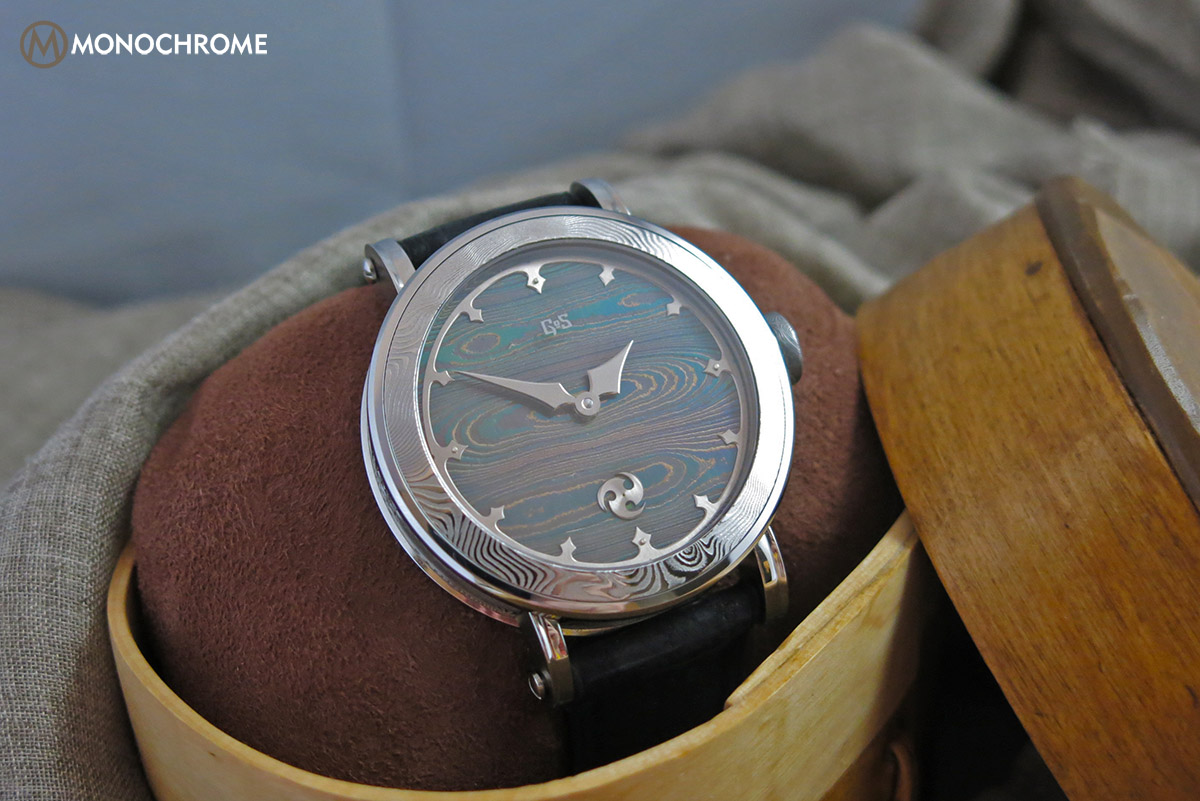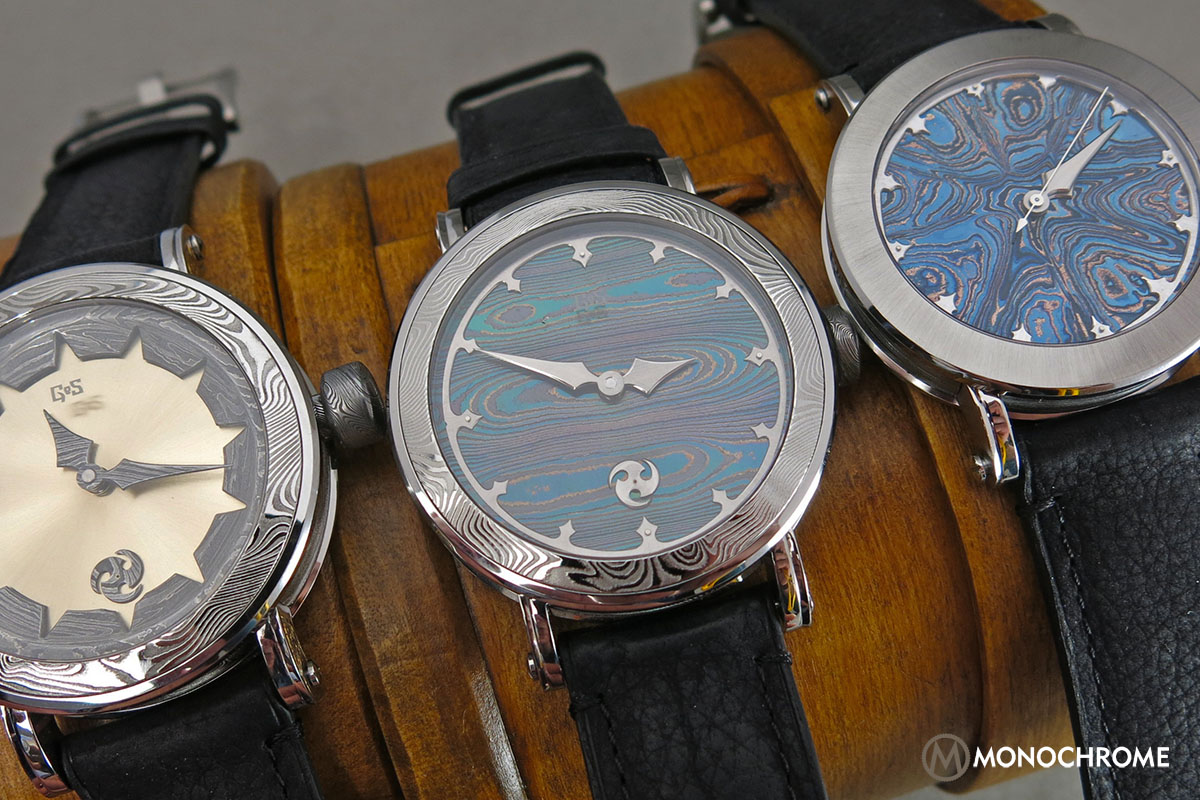Gustafsson & Sjögren Aurora – Review With Live Photos and Price

The Aurora Borealis, AKA the ‘Northern Lights’ are a natural display of light found on the northern hemisphere. If you’ve had the chance to witness them first-hand you’ll know, they are nothing short of spectacular. Streaks of blue, green, purple and yellow light shooting across the sky in mesmerizing fashion. The same effect is achieved with the Gustafson & Sjögren’s watches due to its Damascus steel features. We go hands-on with number 1 of 5 of the new GoS Aurora, which took inspiration from this arctic sunrise.

The GoS Aurora is named after the Aurora Borealis which in turn is named after a Roman goddess, and the connection between the Swedish brand and Scandinavian heritage is obvious. Damascus steel is being made in Scandinavia for hundreds of years, and the Aurora Borealis draws thousands of tourists to the arctic regions. The team of master blacksmith Johan Gustafson and master watchmaker Patrik Sjögren tried to capture the essence ofthe northern lights in the Aurora, which was officially introduced at Baselworld this year. Just prior to the fair we had the opportunity to spend some hands-on time with the very first watch in the series of 5 timepieces.

Overall Appearance
The patterned Damascus steel is the main attraction of the watch, but with the Aurora the steel is used in more than just the case and dial, the movement gets a bit of Johan Gustafson’s touch as well. The strikingly colored dial catches the eye quickly and it’s uncluttered design gives full view of the swirls in the steel.
The large size of the case gives the Aurora a great deal of wrist-presence but isn’t too large to bear. People are intrigued by the design of the watch, and the patterns in the steel. When asked what they think it is, most people say “engraved” but on further inspection say “no, it’s something else but what….”. Explaining the process and characteristics of the watch is part of the fun in this business (for us anyway), and there is quite a bit to talk about here.

Features
In terms of actual features, there is nothing here that we haven’t heard about or seen before. Central hour and minutes hand, a small seconds indicator at 6 o’clock and a crown at 3 o’clock are a clear giveaway of the base of the movement; an ETA/Unitas 6498. No harm in that however, they have proven to be very reliable, and Gustafsson & Jorgen have played around with it, to set it apart from the generic movement. More on that later…
The traditional methods in creating the steel for the case and dial date back further then the techniques used in watchmaking. They require skill and knowledge that is hard to come by. The greatest feature is not a complication, not some fancy indication of something you need, desire or just lust after. No, the greatest feature is steel, Damascus steel.

Dial and hands
The stainless Damascus steel dial is made with different alloys, resulting in a varied pattern after treatment. The forged steel is acid treated to reveal colors and contrast and by applying this in several steps and methods it brings out variations, mimicking the streaks of light of the Aurora Borealis.
Interestingly, no two dials and cases (or any other Damascus steel part for that matter) are the same. Even though the Aurora is a run of just five watches, you will not find two or more watches that are exactly the same. The dials are selected from one solid ingot of Damascus steel, where the inspiration for the watch is matched with the pattern and colors of the steel in order to get the theme of the dial just right.

Keeping the theme for the watch in mind, Johan Gustafsson has to prepare the steel to get the desired result for the dial and cases. If a mosaic pattern is needed, steel is placed in the predetermined pattern. If a “standard” Damascus steel is desired, it all depends on temperature, selected alloys and the number of steps in the forging process how the ingot and thus the dials will look. For every dial they produce, there is quite a large amount of material discarded.
The somewhat “trademark” GoS hands are done in white gold. The sword shaped hours and minutes hand have been beveled and polished by hand. At 6 o’clock the small seconds are indicated by the triple-drinking-horn. The size of the “hand” make it seem to be rotating quite slowly but at least it doesn’t take away too much attention from the dial.

Case and strap
Any case of any GoS is something unparalleled in the industry. Each case is hand forged and finished by the Finish duo, and the result is similar to the dials; no two are alike.
The 45mm wide and 10mm thick Damascus steel case feels very crisp and solid. Textures can be compared to something akin to wood-grain, or perhaps even fingerprints. The surface of the case is polished and this results in a sharp contrast between the surface lines and the lower lines that look grained and matte in terms of finishing. The caseback features the GoS logo at 9 o’clock. You will find a flat sapphire crystal on the front and back of the Aurora, treated with an anti-reflective coating. The stainless steel caseback is held in place with eight screws.

The 9mm wide Damascus steel crown is large, especially considering the height of the overall case. Despite the diameter of the crown in regards with the height, the crown doesn’t dig into the wrist like a diamond-shaped crown on an IWC Big Pilot for instance and is a lot slimmer than the Midnight Sun or the Bifrost Isbla. You can clearly see the difference in the group-pictures. The crown has a modest thickness and a rounded top. The grip is good, which makes for easy and comfortable time setting.
GoS’s Aurora comes on a very smooth, supple nubuck strap. The black leather, finished with fine black stitching, is very soft to the touch. The texture of the strap is slightly grainy, which accompanies the engraved feel of the acid-etched Damascus steel. The strap features a stainless steel buckle, engraved with the GoS logo.

Movement
Inside the Aurora ticks an adjusted ETA/Unitas 6498, so it has a traditional central hour and minute hand combined with a small seconds indicator at 6 o’clock. The standard 6498 movement is nothing too special to look at, but GoS wouldn’t be GoS if they didn’t add some details to it. The movement of the Aurora is visually enhanced with a main plate and balance bridge of Damascus steel in a steel-grey color.

The parts are mirror polished before taking a plunge into an acid-bath to reveal the pattern. The acid removes surface material ever so slightly from several types of steel used in the forged ingot, while others remain unaffected. Surfaces that need clear tolerances to ensure a solid working movement and accurate timekeeping must be protected from the acid. After the etching procedure, the contrast of the pattern is enhanced by further polishing. The end result is a pattern that is highly visible.

Verdict- pros and cons
Pros
- Very wearable due to curved lugs, despite measuring 45mm in diameter
- Unusual choice of materials, involving age-old skills gives character to the brand and watches
- A limited run of watches although no two are alike but share a certain theme
Cons
- Pricey with regards to selected movement despite Damascus steel application
- Measuring 45mm in diameter, might be too large for most, despite being very wearable
The Gustafsson & Sjögren Aurora is available at a price of 16,500 Euros. It might seem a lot if you consider it is powered by a humble ETA 6498, but you have to take the process of producing the dials and cases into consideration. It gives you something very different; you won’t find another one at a get-together any time soon.
For more information about the Gustafsson & Sjögren, and for a detailed impression of the process and possibilities of forging Damascus steel, we suggest you check out their website and Facebook-page.

















